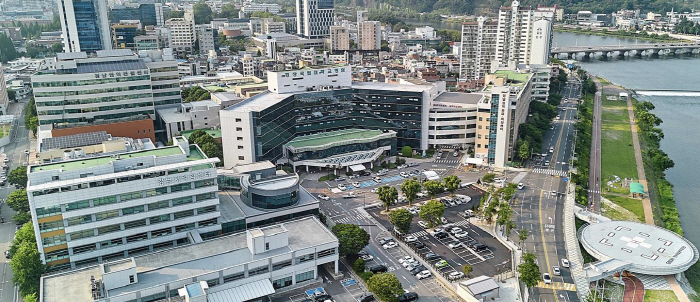Gyeongsang National University Hospital selected excellent regional cardiovascular disease center...He plays the role of a local health protector. Talk Talk Talk
Gyeongsang National University Hospital (Hospital Director Ahn Sung-ki) Regional Cardiovascular Disease Center (Center Director Ko Jin-shin) was selected as an excellent center in the '2025 Regional Cardiovascular Disease Center Operation Evaluation' organized by the Ministry of Health and Welfare.
In this evaluation, the Gyeongnam Cardiovascular Disease Center is a base hospital for cardiovascular diseases in Gyeongnam, and has been evaluated as contributing to improving the health of the community by showing excellent performance in all areas from emergency treatment to rehabilitation and prevention management.
The 'Cardiovascular Center' in the Gyeongsangnam-do Cardiovascular Disease Center has a stable treatment system by possessing more than the prescribed quantity of essential equipment and meeting manpower standards such as intervention certification doctors and cardiovascular thoracic surgeons.
The 'cerebrovascular center' stood out for continuously maintaining high-quality stroke care even in a difficult environment.
The 'Corebrain Rehabilitation Center' showed positive results in the continuity and effectiveness of patient management, such as improved outpatient follow-up indicators.
The Prevention Management Center' has demonstrated excellent operational performance in all indicators, including patient and guardian education, telephone tracking management, local professional manpower training, and campaign implementation for local residents, and in particular, the continuity rate of smoking cessation has improved compared to the previous year, contributing significantly to improving community health.
Koh Jin-shin, Director of the Center for Cardiovascular Disease in South Gyeongsang Province, once again proved its status as a base hospital in this evaluation by minimizing the regional medical gap by continuing emergency cardiovascular disease-related treatment despite difficult medical environments both internally and externally"We will continue to do our best to respond to and treat emergency situations in the region, improve the medical system, and strengthen regional cooperation to improve public health." he said.
In this evaluation, the Gyeongnam Cardiovascular Disease Center is a base hospital for cardiovascular diseases in Gyeongnam, and has been evaluated as contributing to improving the health of the community by showing excellent performance in all areas from emergency treatment to rehabilitation and prevention management.
The 'Cardiovascular Center' in the Gyeongsangnam-do Cardiovascular Disease Center has a stable treatment system by possessing more than the prescribed quantity of essential equipment and meeting manpower standards such as intervention certification doctors and cardiovascular thoracic surgeons.
The 'cerebrovascular center' stood out for continuously maintaining high-quality stroke care even in a difficult environment.
The 'Corebrain Rehabilitation Center' showed positive results in the continuity and effectiveness of patient management, such as improved outpatient follow-up indicators.
The Prevention Management Center' has demonstrated excellent operational performance in all indicators, including patient and guardian education, telephone tracking management, local professional manpower training, and campaign implementation for local residents, and in particular, the continuity rate of smoking cessation has improved compared to the previous year, contributing significantly to improving community health.
Koh Jin-shin, Director of the Center for Cardiovascular Disease in South Gyeongsang Province, once again proved its status as a base hospital in this evaluation by minimizing the regional medical gap by continuing emergency cardiovascular disease-related treatment despite difficult medical environments both internally and externally"We will continue to do our best to respond to and treat emergency situations in the region, improve the medical system, and strengthen regional cooperation to improve public health." he said.
|
This article was translated by Naver AI translator.




